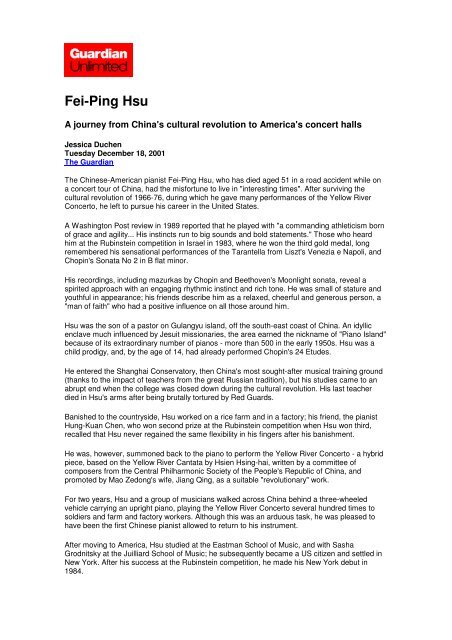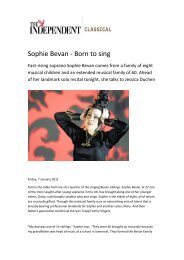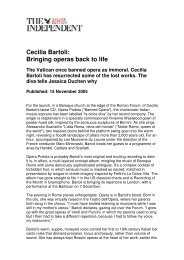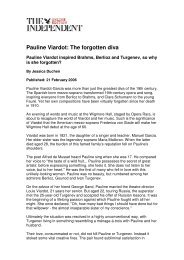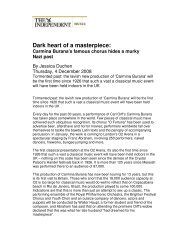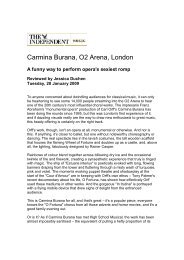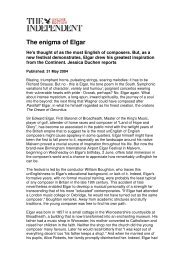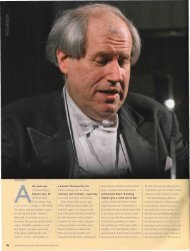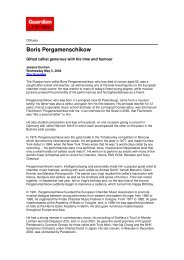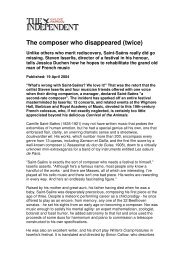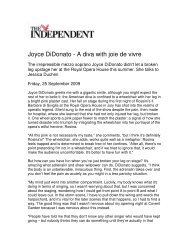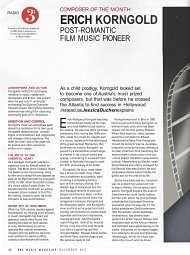Fei-Ping Hsu - Jessica Duchen
Fei-Ping Hsu - Jessica Duchen
Fei-Ping Hsu - Jessica Duchen
Create successful ePaper yourself
Turn your PDF publications into a flip-book with our unique Google optimized e-Paper software.
<strong>Fei</strong>-<strong>Ping</strong> <strong>Hsu</strong><br />
A journey from China's cultural revolution to America's concert halls<br />
<strong>Jessica</strong> <strong>Duchen</strong><br />
Tuesday December 18, 2001<br />
The Guardian<br />
The Chinese-American pianist <strong>Fei</strong>-<strong>Ping</strong> <strong>Hsu</strong>, who has died aged 51 in a road accident while on<br />
a concert tour of China, had the misfortune to live in "interesting times". After surviving the<br />
cultural revolution of 1966-76, during which he gave many performances of the Yellow River<br />
Concerto, he left to pursue his career in the United States.<br />
A Washington Post review in 1989 reported that he played with "a commanding athleticism born<br />
of grace and agility... His instincts run to big sounds and bold statements." Those who heard<br />
him at the Rubinstein competition in Israel in 1983, where he won the third gold medal, long<br />
remembered his sensational performances of the Tarantella from Liszt's Venezia e Napoli, and<br />
Chopin's Sonata No 2 in B flat minor.<br />
His recordings, including mazurkas by Chopin and Beethoven's Moonlight sonata, reveal a<br />
spirited approach with an engaging rhythmic instinct and rich tone. He was small of stature and<br />
youthful in appearance; his friends describe him as a relaxed, cheerful and generous person, a<br />
"man of faith" who had a positive influence on all those around him.<br />
<strong>Hsu</strong> was the son of a pastor on Gulangyu island, off the south-east coast of China. An idyllic<br />
enclave much influenced by Jesuit missionaries, the area earned the nickname of "Piano Island"<br />
because of its extraordinary number of pianos - more than 500 in the early 1950s. <strong>Hsu</strong> was a<br />
child prodigy, and, by the age of 14, had already performed Chopin's 24 Etudes.<br />
He entered the Shanghai Conservatory, then China's most sought-after musical training ground<br />
(thanks to the impact of teachers from the great Russian tradition), but his studies came to an<br />
abrupt end when the college was closed down during the cultural revolution. His last teacher<br />
died in <strong>Hsu</strong>'s arms after being brutally tortured by Red Guards.<br />
Banished to the countryside, <strong>Hsu</strong> worked on a rice farm and in a factory; his friend, the pianist<br />
Hung-Kuan Chen, who won second prize at the Rubinstein competition when <strong>Hsu</strong> won third,<br />
recalled that <strong>Hsu</strong> never regained the same flexibility in his fingers after his banishment.<br />
He was, however, summoned back to the piano to perform the Yellow River Concerto - a hybrid<br />
piece, based on the Yellow River Cantata by Hsien Hsing-hai, written by a committee of<br />
composers from the Central Philharmonic Society of the People's Republic of China, and<br />
promoted by Mao Zedong's wife, Jiang Qing, as a suitable "revolutionary" work.<br />
For two years, <strong>Hsu</strong> and a group of musicians walked across China behind a three-wheeled<br />
vehicle carrying an upright piano, playing the Yellow River Concerto several hundred times to<br />
soldiers and farm and factory workers. Although this was an arduous task, he was pleased to<br />
have been the first Chinese pianist allowed to return to his instrument.<br />
After moving to America, <strong>Hsu</strong> studied at the Eastman School of Music, and with Sasha<br />
Grodnitsky at the Juilliard School of Music; he subsequently became a US citizen and settled in<br />
New York. After his success at the Rubinstein competition, he made his New York debut in<br />
1984.
<strong>Hsu</strong> was sustained by his strong Christian faith. According to Hung-Kuan Chen, he had been<br />
diagnosed with cancer while still in his teens, but had refused treatment, feeling that "if it was<br />
his time to go, he would". That time came when the van in which he was travelling hit a<br />
stationary tractor on a dark road near Qiqihar, in north-eastern China.<br />
<strong>Hsu</strong> is survived by his wife and daughter.<br />
· <strong>Fei</strong>-<strong>Ping</strong> <strong>Hsu</strong>, pianist, born December 20 1949; died November 27 2001


